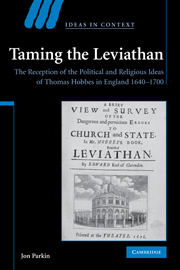 Taming the Leviathan
Taming the Leviathan Book contents
- Frontmatter
- Contents
- Acknowledgements
- Introduction
- 1 Reading Hobbes before Leviathan (1640–1651)
- 2 Leviathan (1651–1654)
- 3 The storm (1654–1658)
- 4 Restoration (1658–1666)
- 5 Hobbes and Hobbism (1666–1675)
- 6 Hobbes and the Restoration crisis (1675–1685)
- 7 Hobbism in the Glorious Revolution (1685–1700)
- Conclusion
- Bibliography
- Index
- Ideas in Context
1 - Reading Hobbes before Leviathan (1640–1651)
Published online by Cambridge University Press: 05 May 2010
- Frontmatter
- Contents
- Acknowledgements
- Introduction
- 1 Reading Hobbes before Leviathan (1640–1651)
- 2 Leviathan (1651–1654)
- 3 The storm (1654–1658)
- 4 Restoration (1658–1666)
- 5 Hobbes and Hobbism (1666–1675)
- 6 Hobbes and the Restoration crisis (1675–1685)
- 7 Hobbism in the Glorious Revolution (1685–1700)
- Conclusion
- Bibliography
- Index
- Ideas in Context
Summary
THE ELEMENTS OF LAW
Before 1640, Hobbes, secretary to the Earls of Devonshire, was known to the literate public as humanist scholar, a poet and a translator. Hobbes had been responsible for the standard English version of Thucydides' Eight bookes of the Peloponnesian Warre (1629), and he was also the author of De mirabilibus pecci (1627), an occasionally obscene country house poem that Hobbes ultimately despised, but which remained popular throughout the century. To a smaller circle of scientists associated with Hobbes's Cavendish patrons, the Earls of Devonshire and Newcastle, Hobbes was a respected natural philosopher, a former amanuensis to Francis Bacon who, although he had come late to the study of mathematics and natural philosophy, nevertheless promised much.
Hobbes got his first taste of direct involvement in the politics of the 1640s as a politician rather than a political theorist, being proposed as prospective Member of Parliament for Derbyshire for the Short Parliament of 1640. The Derbymen were resolved, however, ‘to give no way to the election of Mr Hobs’, according to one contemporary, a rejection that invites the thought that the Derbyshire constituents were passing one of the earliest verdicts upon Hobbes's political outlook. But as so often when looking at contemporary reactions to Hobbes, one has to be careful to look at the context before assuming that any personal notoriety was at issue.
- Type
- Chapter
- Information
- Taming the LeviathanThe Reception of the Political and Religious Ideas of Thomas Hobbes in England 1640–1700, pp. 18 - 84Publisher: Cambridge University PressPrint publication year: 2007
